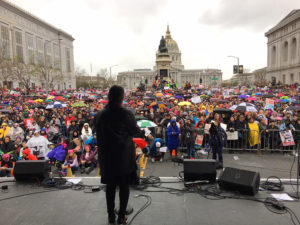Hung Liu San Francisco Women’s March Speech
Saturday, January 21st, 2017
I was born in China in 1948, near the end of the civil war between the Nationalists and the Communists. My father was a captain on the Nationalist side, and we lived in Changchun, a city under siege by Communist forces. During the 150 days of that siege, nearly 150,000 people starved to death. Many tried to leave, but were caught in a no-man’s-land between the two armies. The only way to survive was to flee, so my mother and her older sister, along with my uncle, my father, and my grandparents, tried to escape – I was 6 months old.
When I was six years old, my mother told me a story about that journey that I have never forgotten. She said that while fleeing the fighting around Changchun with countless other refugees – with no food and under fire – our family passed by a river. Sitting alone on the riverbank was a baby. The baby’s mother had set it down and stepped into the river’s rushing water. Nobody picked up the baby. Everyone just kept walking. I asked my mother if she would ever have drowned herself and abandoned me by the river. She looked at me and said, “I don’t know.”
In 1968 – at the age of twenty – I was sent to the countryside for proletarian re-education during the Cultural Revolution. I worked as a peasant 360 days a year for four years, mostly growing wheat and corn. I remember one day looking up from the field and seeing an airplane high overhead, cutting silently through the sky. I wondered where it was going, and if I would ever be able to go there too.
After long days in the fields, the only escape was into the pages of books, most of which were politically dangerous. I hid them under my pillow, and my friends and I would secretly pass them between us. They included Chinese translations of “The Rise and Fall of the Third Reich” by William Shrier, Victor Hugo’s “Les Miserables,” Balzac’s “The Human Comedy,” and “Jean-Christophe,” by Nobel Prize winner Romain Rolland.
“Jean-Christophe” repeats the legend of Saint Christopher, the patron saint of travelers, who carried people across a dangerous river. One day he carried a small child who was unknown to him, and the child became so heavy, and the river became so strong, that Christopher barely made it across. In Rolland’s telling, it took all night, and as the new dawn broke across the eastern sky, Christopher turned to the child and said: “Here we are! How heavy you are. Child, who are you?” The child replied, “I am the day soon to be born.”
In 1981 I applied for a Chinese passport so I could study in the United States. After making me wait for four years, the Chinese government finally let me go. Meanwhile, it took only four minutes to get my visa from the American embassy in Beijing. My first time on an airplane I flew to San Francisco. I carried $20 and two suitcases. I was 36 years old and I had just crossed the Pacific.
The story of America as a destination for the homeless and hungry of the world is not only a myth. It is a story of desperation, of sadness, of uncertainty, of leaving your home. It is also a story of courage, of sacrifice, of determination, and – more than anything – of hope. There will be many rivers to cross in the months and years ahead, some of them dark and swollen. But we must not become hopeless.
I never knew what happened to that baby by the river. In my heart, I have carried her with me all my life. I am here only because my mother carried me. Now, we must carry each other until a new dawn breaks across the American sky.

